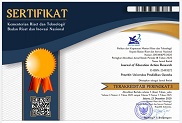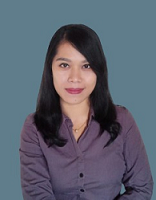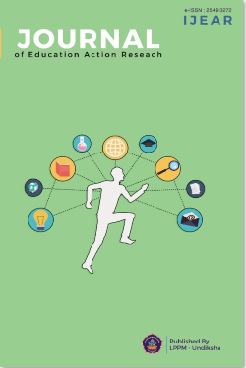From Flawed to Flourishing: Reshaping the Nigerian Curriculum for Sustainable National Development
DOI:
https://doi.org/10.23887/jear.v7i4.67812Keywords:
Nigerian Curriculum, Sustainable National Development, Curriculum ReformAbstract
The Nigerian education system plays a crucial role in shaping the nation's future. However, over the years, there have been concerns about the effectiveness and relevance of the curriculum in preparing students to face rapidly changing global challenges. This research aims to explore the weaknesses within the current Nigerian curriculum and propose strategies to reshape it to drive sustainable national development. It is a comprehensive and systematic literature review, a critical step to thoroughly understand the challenges within Nigeria's curriculum and identify potential improvement strategies. This research allows for a comprehensive synthesis of scholarly articles, governmental reports, and educational publications, establishing a strong foundation for subsequent methodologies. The study begins by analyzing the current state of the Nigerian curriculum, highlighting its limitations and shortcomings. It delves into how the curriculum inadequately addresses critical skills and competencies needed by the 21st-century workforce, such as critical thinking, problem-solving, creativity, and digital literacy.The study emphasizes the need for continuous evaluation mechanisms and feedback to ensure the effectiveness of the modified curriculum. Regular assessments and monitoring systems should be implemented to measure the impact of curriculum changes and identify areas for improvement. By addressing these deficiencies and integrating relevant and practical skills, the curriculum can better prepare students to face future challenges.
References
Achor, E. E. (2010). Revolutionalising Higher Education In Nigeria To Meet Emerging Global Challenges : Focus On Ict , Curriculum Innovation And. 91–99.
Aderinoye, R., & Ojokheta, K. (2021). International Review Of Research In Open And Distributed Learning Open-Distance Education As A Mechanism For Sustainable Development : Reflections On The Nigerian Experience Open-Distance Education As A Mechanism For Sustainable Development : Reflections .
Ahmadi, A. A., & Lukman, A. A. (2015). Issues And Prospects Of Effetive Implementation Of New Secondary School Curriculum In Nigeria. Journal Of Education And Practice, 6(34), 29–39. Http://Search.Ebscohost.Com/Login.Aspx?Direct=True&Db=Eric&AN=EJ1086103&Site=Ehost-Live.
Alade, I. A. (2020). Beyond The Formal Curriculum: Vocational/Technical And Economic Empowerment Programmes For Family Sustainability In Nigeria. Al-Hikmah Journal Of Education, 7(1), 39–47. Https://Www.E-Ir.Info/2018/01/14/Securitisation-Theory-An-Introduction/.
Andrews, J., & Higson, H. (2008). Graduate Employability, “Soft Skills” Versus “Hard” Business Knowledge: A European Study. Higher Education In Europe, 33(4), 411–422. Https://Doi.Org/10.1080/03797720802522627. DOI: https://doi.org/10.1080/03797720802522627
Awaah, F., Okebukola, P. A., Ebisin, A., Agbanimu, D., Peter, E. O., Ajayi, O. A., Gbeleyi, O. A., Onyewuchi, F. A., Oladejo, A. I., Adewusi, M. A., Ademola, I., Onowugbeda, F., Odekeye, T., & Lawal, R. (2021). Influence Of Gender And Career Interest On African University Students’ Perceived Difficult Concepts In The Study Of Public Administration. Teaching Public Administration, 39(2), 227–245. Https://Doi.Org/10.1177/0144739420968870. DOI: https://doi.org/10.1177/0144739420968870
Awang, H., & Ramly, I. (2008). Creative Thinking Skill Approach Through Problem-Based Learning. World Academy Of Science, Engineering And Technology, 16(1), 635–640. Http://Citeseerx.Ist.Psu.Edu/Viewdoc/Download?Doi=10.1.1.306.7430&Rep=Rep1&Type=Pdf.
Dufera, S. D. (2006). Tension Between Traditional And Modern Teaching-Learning Approaches In Ethiopian Primary Schools. Journal Of International Cooperation In Education, 9(1), 123–140.
Emes, C., & Cleveland-Innes, M. (2003). A Journey Toward Learner-Centered Curriculum. Canadian Journal Of Higher Education, 33(3), 47–69. Https://Doi.Org/10.47678/Cjhe.V33i3.183440. DOI: https://doi.org/10.47678/cjhe.v33i3.183440
Hodge, K. A., & Lear, J. L. (2011). Employment Skills For 21st Century Workplace: The Gap Between Faculty And Student Perceptions. Journal Of Career And Technical Education, 26(2), 28–41. Https://Doi.Org/10.21061/Jcte.V26i2.523. DOI: https://doi.org/10.21061/jcte.v26i2.523
Jacobs, H. (2012). CURRICULUM 21, Essential Education For A Changing World. Alexandria, Virginia USA: ASCD, 2010., 251 Str. Pedagogijska Istraživanja, 9(1/2), 247–250.
Kean, A. C., & Kwe, N. M. (2014). Meaningful Learning In The Teaching Of Culture: The Project Based Learning Approach. Journal Of Education And Training Studies, 2(2), 189–197. Https://Doi.Org/10.11114/Jets.V2i2.270. DOI: https://doi.org/10.11114/jets.v2i2.270
Madanaguli, A., Srivastava, S., Ferraris, A., & Dhir, A. (2022). Corporate Social Responsibility And Sustainability In The Tourism Sector: A Systematic Literature Review And Future Outlook. Sustainable Development, 30(3), 447–461. Https://Doi.Org/10.1002/Sd.2258. DOI: https://doi.org/10.1002/sd.2258
Maiorana, V. P. (1992). Critical Thinking Across The Curriculum : Building The Analytical Classroom (Issue 10).
Mtsweni, E. S., Hörne, T., Poll, J. A. Van Der, Rosli, M., Tempero, E., Luxton-Reilly, A., Sukhoo, A., Barnard, A., M. Eloff, M., A. Van Der Poll, J., Motah, M., Boyatzis, R. E., Kusumasari, T. F., Trilaksono, B. R., Nur Aisha, A., Fitria, -, Moustroufas, E., Stamelos, I., Angelis, L., … Khan, A. I. (2020). Engineering, Construction And Architectural Management, 25(1), 1–9. Http://Dx.Doi.Org/10.1016/J.Jss.2014.12.010%0Ahttp://Dx.Doi.Org/10.1016/J.Sbspro.2013.03.034%0Ahttps://Www.Iiste.Org/Journals/Index.Php/JPID/Article/Viewfile/19288/19711%0Ahttp://Citeseerx.Ist.Psu.Edu/Viewdoc/Download?Doi=10.1.1.678.6911&Rep=Rep1&Type=Pdf.
O. Igbokwe, C. (2015). Recent Curriculum Reforms At The Basic Education Level In Nigeria Aimed At Catching Them Young To Create Change. American Journal Of Educational Research, 3(1), 31–37. Https://Doi.Org/10.12691/Education-3-1-7. DOI: https://doi.org/10.12691/education-3-1-7
Salas-Velasco, M. (2023). Vocational Education And Training Systems In Europe: A Cluster Analysis. European Educational Research Journal, 147490412211511. Https://Doi.Org/10.1177/14749041221151189. DOI: https://doi.org/10.1177/14749041221151189
Scott, C. L. (2015). Education Research And Foresight The Future Of Kearning 3: What Kind Of Pedagogies For The 21st Century? Educational Research And Foresight UNESCO, 1(1), 1–14.
Singh Malik, R. (2018). Educational Challenges In 21st Century And Sustainable Development. Journal Of Sustainable Development Education And Research, 2(1), 9–20. DOI: https://doi.org/10.17509/jsder.v2i1.12266
Snyder, L. G., & Snyder, M. J. (2008). Optional Teaching Critical Thinking And Problem Solving Skills. The Journal Of Research In Business Education, 50(2), 90.
Tzenios, N. (2022). Learner-Centered Teaching. International Research Journal Of Modernization In Engineering Technology And Science, December, 2–6. Https://Doi.Org/10.56726/Irjmets32262. DOI: https://doi.org/10.56726/IRJMETS32262
Viennet, R., & Pont, B. (2017). Education Policy Implementation: A Literature Review And Proposed Framework. OECD Education Working Papers, No. 162. OECD Education Working Papers, 162(December), 63. Www.Oecd.Org/Edu/Workingpapers
Yosso, T. J. (2002). Toward A Critical Race Curriculum. Equity And Excellence In Education, 35(2), 93–107. Https://Doi.Org/10.1080/713845283. DOI: https://doi.org/10.1080/713845283
Yusuf, F., & Adeoye, E. (2012). Developing Critical Thinking And Communication Skills In Students: Implications For Practice In Education. African Research Review, 6(1), 311–324. Https://Doi.Org/10.4314/Afrrev.V6i1.26. DOI: https://doi.org/10.4314/afrrev.v6i1.26
Downloads
Published
How to Cite
Issue
Section
License
Copyright (c) 2023 Moses Adeleke Adeoye, Musa Aremu Mahmud, Ronke Elizabeth Ehindero, Rasheedat Oladunni Ajape, Ajoke Kudirat Yahaya, Joshua Durotoye Jolaoye

This work is licensed under a Creative Commons Attribution-ShareAlike 4.0 International License.












